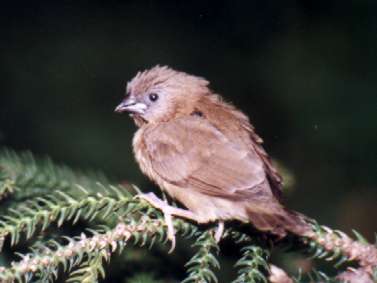What to do with an abandoned baby bird?
(published in Window, June 1999, titled "Abandoned Baby Birds -- How can You Help?")

What to do with an abandoned baby bird?
(published in Window, June 1999, titled "Abandoned Baby Birds -- How can You Help?")

Every spring and summer, students find a number of baby birds that appear to have been abandoned. Many people try to help these birds by taking them home and trying to raise them. However, these are wild animals and usually do not survive long in captivity. So what should be done when you find a helpless baby bird?
More often than not, the baby bird has not been abandoned by its parents; it may have simply fallen out of the nest on its first flight, or it may have been crowded out of the nest by its siblings. In these instances, the parent birds will usually respond to the baby bird's call and lead it back to the nest. Often, the parent birds are already nearby when you find the baby bird, waiting for you to leave the area, so the best thing for you to do is to get away and see if the parents return. Be sure that you are far enough away or well hidden; otherwise, you might be keeping the parent birds away from their young. If, however, the parents do not return, or if there is immediate danger from predators, people, or traffic, then gently pick up the bird and put it in a box punched with holes and lined with newspaper. Avoid using birdcages because wild birds panic when confined inside a cage.
Now what do you do? If possible, immediately take the bird to the Wild Bird Society of Taipei where trained volunteers will attempt to hand-rear chicks or treat injured birds. Those that survive will ultimately be returned to the wild. The Wild Bird Society of Taipei is located at No. 3, Lane 160, Sec. 2, Fu-Shing S. Rd. and its phone number is 2325-9190. If it is not possible to take the bird to the wild bird society immediately, give it some water in a shallow dish and try feeding it birdseed, fruits, or mealworms. Depending on the age of the chick, it may or may not eat on its own. Very young birds may also need heat from a lamp. Do not keep the bird like this very long; rush it to the wild bird society as soon as you get a chance. Never should you try to raise wild birds in captivity. Baby birds may appear cute and tame, but they are wild animals and are very difficult to care for.
If the bird dies, or if you find a dead bird, do not discard it! Even dead birds can contribute to the limited knowledge we have of birds. Wrap the carcass with layers of newspaper and seal it in a plastic bag, then put the whole thing in the freezer until it is convenient for you to take the bird to the wild bird society. The Wild Bird Society of Taipei preserves dead birds and stores them in museums. Be sure to record when and where the bird was found, and if possible, how it died.
Life and death in the natural world may seem cruel and relentless, but these rules have operated through millions of years of evolution. There are those that will live and those that will die. Our interference in this cycle is based on our kind human nature. We will never know whether our actions really benefit the birds, but so many animals have suffered or perished because of the activities of humankind that it seems only reasonable for us to lend a helping hand whenever we can.
NOTE: In the U.S. all birds are protected by the Migratory Bird Treaty, so handling any bird or bird part without a permit is against the law.
See also What to Do If You Find a Baby Bird